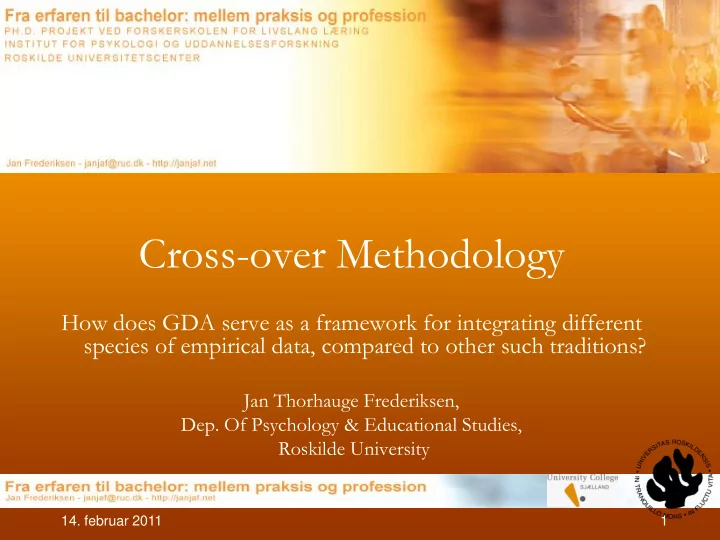

Cross-over Methodology How does GDA serve as a framework for integrating different species of empirical data, compared to other such traditions? Jan Thorhauge Frederiksen, Dep. Of Psychology & Educational Studies, Roskilde University 14. februar 2011 1
Multiple Empirical Forms of Data • Triangulation – Different measurings of the same phenomenon • Bricolage (Levi-Strauss, Kincheloe) – Adapting data production to conditions in the field, on the fly • Mixed Methods (Creswell & Clark, Flick, Johnson, Brannen, Bryman) – Different empirical phases in an epistemological - ly coherent design 14. februar 2011 2
Levels of Method Integration • Empirical: Data relating to data – Same individuals are reconstructed in different empirical ways • Analytical: constructs relating to constructs – Analytical constructs are related to each other • Theoretical: relations between systems of constructs – relations guided by theoretical interpretations • Structural / Sequential: related by design – E.g. findings guiding interviewee selection 14. februar 2011 3
Integrational shortcomings • Triangulation: solely interpretational integration – a theoretical claim of measurability • Bricolage: a claim of inherent, empirical integration achieved on the fly (Kincheloe 2001) • Mixed Methods: structural integration implying complete integration (Design towards specific forms of knowledge production) (Brannen 2005) Yet all presume data incommensurability, and method incongruence 14. februar 2011 4
The production of the scientific object Inherent assumptions of relations between data and methods. E.g.: production of the statistical object: Cleaning, recoding, transforming – what assumptions are imposed on data in these steps? implicit relations on all levels: implicit theoretical assumptions relating methods Implicit empirical connections Implicit analytical consistency The conditions of production may be uninspectable 14. februar 2011 5
GDA – opportunities for explicitation Quantitative findings often dissociated from individuals implicit a priori connections with no individual relations Benzécri : Statistically quantities [defined] in such a manner that the final construction will be independent from arbitrary constructions due to apriori ideas (1984:128) What currents of law traverse the ocean of data? (1973:v) 14. februar 2011 6
Sample Study – social educators A study on the relations between social origin of students, and the educational strategies, and the demands of the training (Frederiksen 2010) 14. februar 2011 7
14. februar 2011 8
Specific MCA – Active Questions Soc.educ. Experience: Education(7+2) • Nursery/Nursery School(3) • Afterschool/SFO(2) Previous • Special Care(2) career(5) • Other experience(2) - None • Daycare(2) - Health/care - • SocEduc Courses before(2) Teacher/club • Coach/Scout/Voluntary(2) - Shop/Office - Craftsman/Art 14. februar 2011 9
Eigenvalues and modified rates 0,2500 Eigenvalues 0,2000 0,1500 0,1000 0,0500 0,0000 1 3 5 7 9 11 13 15 17 19 21 23 25 27 Axis Eigenvalue Rate of variance Accumulated modified rate of variance 1 0,2051 10,23% 36,5% 2 0,1989 20,14% 68,6% 3 0,1691 28,57% 83,5% 14. februar 2011 10
Educational Capital+ Capital of Vocational capital + Care+ As I am mainly concerned with methods here, I won’t go into CTRs etc. 14. februar 2011 11
Empirical connections Data relating to data: Interview-willingness and position in the space of student student trajectories Allows me to assess the interviews as empirical products in relation to the other data, e.g.in terms of validity or resistance 14. februar 2011 12
Analytical connections On the one hand: On the other hand • Strategies, as • Dominant and constructed from dominated positions interviews with in social space, as students, and created by sMCA of classroom student admission observations data 14. februar 2011 13
Necessary Knowledge Investment strategy dominated by Care-based educational Ascent strategy 14. februar 2011 14
Interpretational connections Biographical analysis Structured Data Analysis Central transistional event Regional recruitment in biography of a young differences related to student, Anita: - educational capital Moving away from - age provinces, to Capital - complexity of Escaping provincial lifestyle, limited employment educational & working opportunities, making use of career educational capital 14. februar 2011 15
The biographical transition from province to capital made by Anita reiterates the structural opposition between capital and provincial NISE. She literally moves to where her sort of students are to be found. 14. februar 2011 16
In Conclusion … • Empirical relations are inherently avaiable in GDA, providing many new avenues of analysis • Analytical relations may both be explicated and depic- ted visually compelling, and the geometrical depictions allows for multidimensional appraisal of relations easily thought of as binary, or dichotomous (e.g. dominance) • Theoretical relations – in casu, homologies – may be compared and assessed rigourously, without formalized testing 14. februar 2011 17
Recommend
More recommend